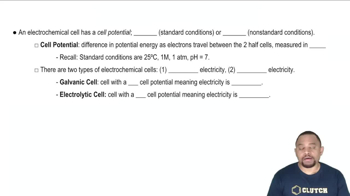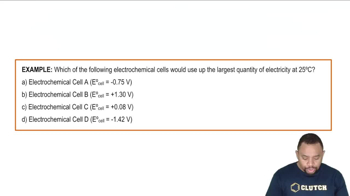Intro to Electrochemical Cells definitions Flashcards
 Back
BackIntro to Electrochemical Cells definitions
1/14
Terms in this set (14)
- Electrochemical CellA device with two half-cells connected by a wire, facilitating redox reactions to produce or consume electricity.
- Half CellA container with an electrode immersed in an electrolyte, representing a half-reaction in an electrochemical cell.
- ElectrodeA metal rod in a half-cell where oxidation or reduction occurs, facilitating electron transfer.
- ElectrolyteA solution in which the electrode is immersed, allowing ions to move and participate in redox reactions.
- Redox ReactionA chemical process involving the transfer of electrons, comprising oxidation and reduction.
- OxidationA process where an element loses electrons, increasing its oxidation state.
- ReductionA process where an element gains electrons, decreasing its oxidation state.
- Cell PotentialThe energy difference measured in volts as electrons move between half-cells in an electrochemical cell.
- Standard ConditionsConditions of 25°C, 1 M concentration, 1 atm pressure, and pH 7 used to measure standard cell potential.
- Standard Cell PotentialThe cell potential measured under standard conditions, indicating the energy difference in a redox reaction.
- Non-standard Cell PotentialThe cell potential measured under conditions differing from standard, affecting the energy difference.
- Galvanic CellAn electrochemical cell with a positive cell potential, producing electricity.
- Electrolytic CellAn electrochemical cell with a negative cell potential, consuming electricity.
- VoltsThe unit of measurement for cell potential, indicating the energy difference in an electrochemical cell.



